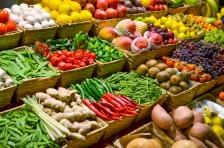Is it safe to eat non-organic vegetables?
Monica Reinagel, MS, LD/N, CNS

A. Some types of fruits and vegetables tend to be higher in pesticide residues than others—because of the way they grow and the type of bugs that tend to get after them. By avoiding these high-pesticide-residue items (or buying them organic), you can cut your exposure to pesticides by up to 90%. Lists like the one you came across are simply a way to prioritize your organic purchases. Because few of us can buy organic 100% of the time, it makes sense to start with the ones where we’re getting the most benefit from our organic dollar.
See also: Are organics worth the cost?
However, the amount of pesticide exposure that you get from these high-pesticide-residue vegetables is still well within the range considered to be safe. If you want to limit your exposure to pesticides (and who wouldn’t?), it’s fine to take these lists into account when making your choices. But it’s important to keep things in perspective.
The Quick and Dirty: The proven health benefits of eating lots of fruits and vegetables (organic or not!) far outweighs the potential dangers of pesticide exposure.
Image courtesy of Shutterstock

